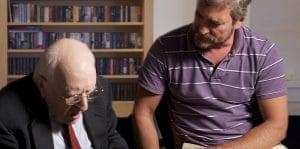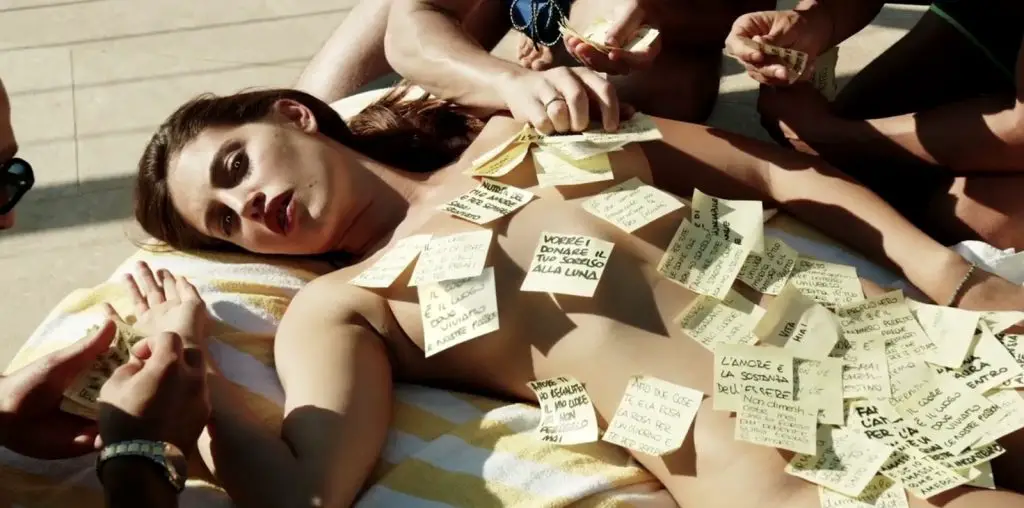
Josh Howard’s documentary The Lavender Scare talks about a phenomenon that I was personally unfamiliar with before watching the film. In the ’50s, when McCarthyism and Anti-Communist sentiments were at an all-time high, the fear of the Russians infiltrating the U.S. government was expansive. Senator McCarthy and Dwight D. Eisenhower spearheaded a movement against gays and lesbians, saying that since they were “sex perverts,” they would be more easily influenced to spy on the government for the communists. Thus began the firing of thousands of gay men and women who had previously worked in government jobs.
Howard based his documentary on the David K. Johnson book of the same name, and I was delighted to be able to speak with him about his adaptation and his personal feelings on how our current political situation is more similar to that of the 1950s than any of us would have ever suspected or wanted.
I really enjoyed this film because I didn’t know a lot about the subject matter before watching it so thank you for that. I just wanted to know how did you come to this project? Had you read the book before?
I didn’t know any of this information either. I think I understood that being gay in the 1950s wasn’t an easy life, but I did not know the specifics of how systematically the government was going about firing people. I came across this book by David Johnson, and I just started reading it. I was amazed at finding out this story. Tens and tens of thousands of people fired from their jobs or kept from jobs. I just had no idea this was going on. It just seemed this might be an interesting subject for a film.
Well, how big of a part did David Johnson play and the making of the documentary?
Well, an enormous part. You know, the film is based on his many years of research, Freedom of Information Act requests, first-person interviews, so the film clearly could not have been made without the work that he put into it and of course, along the way he was very helpful is in editorial questions and he does appear in the film as well, as you know, but the film could not have been made without David’s groundbreaking research on this.

“Tens and tens of thousands of people fired from their jobs or kept from jobs…”
I can imagine. I was wondering; were there people that participated in the book that didn’t participate in the film that was still alive during the filming?
There was nobody who we approached from the book who didn’t agree to be in the film, but you have a big problem that we had, which was David did most of his research during the 1990s. By the time I started working on this in 2009, a number of people had passed away, and we were extremely lucky that Frank Kameny, this really essential character was still alive. And that was the first interview we did even before we raised the money for the film or really had a clear plan of what we were doing. We wanted to get his story on film. And, uh, he passed away a year after we did that interview.
I was thinking about that because at the end, you know, where they show the dates where different people passed away. I was just thinking, “Oh my gosh, this must’ve taken quite some time to put together.”
Well, I read the book in early 2009. The first time I met David was on July 4th of 2009. He was visiting New York. He works and lives in Florida. And that was the first conversation we had about possibly taking his work and turning it into a film. It was just the long journey of mostly raising money, which was the hardest part, which is why it took so long. David and I like to joke that this is the 50th anniversary of Stonewall and it’s the 10th anniversary of when we first met and started this project. So it’s a big year for anniversaries.
I’m glad that it finally came together. How did you get all of these actors involved (Glenn Close, T.R. Knight, Cynthia Nixon, David Hyde Pierce, Zachary Quinto)? Did they know about the project and come to you, or how did that all come together?
Well, each one came from a different connection that I was able to make, but frankly, the film was finished, and we were on the festival circuit. It wasn’t until we started winning some awards and getting some attention that I started getting responses from some of the celebrities that I had been writing to. It was my intention right from the beginning to try to enlist some big names to do some of those voiceover parts. It was very hard until I could actually show what the film was going to be like. It was hard to enlist people, but as I say, once they could see the finished product and see the reaction that it was getting, they were on board. We were very lucky that those five celebrities agreed to be involved.
Do you think that right now we’re kind of setting ourselves up for another event that was close to the subject matter of this film with Trump proposing banning transgender people from the military and all the other things he’s up to? How do you feel about this personally?
Well, I think that’s a great question, and I think we should be concerned. It’s funny. I started the project back in 2009, I saw the film as telling an important story of part of our history. I would never have imagined that some of the messages of the film would be as relevant today as they are, you know. The homophobia of the 1950s was a direct backlash against the time that came before and which, you know, gay men and lesbians were much more widely accepted of. And I think it was Mark Twain that is credited with saying history may not repeat itself, but it often rhymes. I do think that’s the environment we’re in now. And you know, not only the transgender ban but the Trump administration has taken the position that federal civil rights laws don’t apply in cases of sexual orientation. So many judges have been appointed who have histories of ruling against the interests of LGBTQ people. I do see that what started out as a historical project turn into an alarm bell for people today.

“I just always liked the idea of being the first to tell somebody something…that’s why we want to be reporters and journalists…”
I wanted to know as well, what was your family’s kind of approach to LGBTQ people?
Well, I grew up in a liberal family in Brooklyn, New York. It was also a time that people didn’t talk about this. I was born in the 50s, and so, you know, I’m, I’m kind of one generation after Frank Kameny and some of the other people we profiled. But you know, I can’t say that I was out and a gay activist for most of my life, At the moment I really don’t think of myself as a gay activist. I do think of myself as a filmmaker, but at least I am out now, which I wasn’t growing up.
How did your family take it when you came out?
My father was dead, and my mother was very accepting after an initial period of trying to figure out what she did wrong, which I guess is somewhat typical. She quickly came around and was very supportive.
Thank you. I just have one more question, and then I will wrap things up. I ask everybody this just because I’m curious about loving movies myself. Was there a film or a particular television show that you saw growing up that made you want to become a filmmaker?
I’m not sure that my goal was to be a filmmaker. I was a TV news producer, and from a very early age, I loved newspapers and journalism and eventually wound up at 60 Minutes as a, as a producer. I guess I just always liked the idea of being the first to tell somebody something. It’s that its news, and I think that’s why we want to be reporters and journalists. That was the feeling that I had unexpectedly when I came across David Johnson’s book that this is something that people don’t know about. And for a journalist that’s a fun place to be.
Well, are you thinking or considering about making another film at any time or are you just, uh, or was this the one for you?
Well, I suspect. this is the one, you know. I have a couple of years left of work on this in terms of speaking engagements and screening and so forth. You know, half the battle is making the film, and the other half is people seeing it. I’ve just really loved taking it around to community groups and having the kind of conversation that we’re having now. So I really see the next couple of years is still involved in this. And then I think I’ll take another crack at retirement after that.

